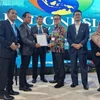Bangkok (VNA) – Thailand’s National Economic and Social Development Council (NESDC) has approved a framework for the country's 13th national economic and social development plan, spanning from 2022 to 2026, with the focus placed on high value-added economic development.
The next national economic and social development plan should aim to provide Thailand a high value-added economy, according to the state planning unit.
This is an appropriate time for Thailand to restructure the manufacturing sector to focus more on high value-added activities, said Danucha Pichayanan, Secretary-General of the NESDC.
A high value-added economy focuses on those activities that generate a large margin between the final price of a product or service and the cost of the inputs used to produce it, thus creating higher profits for businesses and higher wages for workers.
He said under the 13th national plan, Thailand's development will focus mainly on four areas over the next five years.
The first area is to restructure the industrial sector towards higher technology.
Danucha said companies listed on the Stock Exchange of Thailand are still engaged in conventional industries, in contrast to those listed on the Dow Jones Industrial Average, which contains high-technology companies.
Thailand needs to transform the manufacturing sector to higher value-added industry and high technology such as the bio-, circular, green economy, which can increase the value of farm products; electric vehicles, which can create supporting industries including smart electrical parts and a smart grid; and an emphasis on the medical industry, tourism, logistics and digital services, he said.
Danucha said Thailand should no longer focus on a high volume of foreign visitors, instead attempting to attract high-quality foreign visitors with relatively high spending.
The second area of the new plan is to build opportunity for Thais to have more security in their life, both in terms of income and well-being, in order to narrow income disparity, he noted.
Thirdly, the government needs to ramp up its support for community-based businesses and small and medium-sized enterprises, smart city development and a better environment, added Danucha.
The fourth area is high-quality workforce development, improvement of government management to facilitate investors, and public services, he said./.
The next national economic and social development plan should aim to provide Thailand a high value-added economy, according to the state planning unit.
This is an appropriate time for Thailand to restructure the manufacturing sector to focus more on high value-added activities, said Danucha Pichayanan, Secretary-General of the NESDC.
A high value-added economy focuses on those activities that generate a large margin between the final price of a product or service and the cost of the inputs used to produce it, thus creating higher profits for businesses and higher wages for workers.
He said under the 13th national plan, Thailand's development will focus mainly on four areas over the next five years.
The first area is to restructure the industrial sector towards higher technology.
Danucha said companies listed on the Stock Exchange of Thailand are still engaged in conventional industries, in contrast to those listed on the Dow Jones Industrial Average, which contains high-technology companies.
Thailand needs to transform the manufacturing sector to higher value-added industry and high technology such as the bio-, circular, green economy, which can increase the value of farm products; electric vehicles, which can create supporting industries including smart electrical parts and a smart grid; and an emphasis on the medical industry, tourism, logistics and digital services, he said.
Danucha said Thailand should no longer focus on a high volume of foreign visitors, instead attempting to attract high-quality foreign visitors with relatively high spending.
The second area of the new plan is to build opportunity for Thais to have more security in their life, both in terms of income and well-being, in order to narrow income disparity, he noted.
Thirdly, the government needs to ramp up its support for community-based businesses and small and medium-sized enterprises, smart city development and a better environment, added Danucha.
The fourth area is high-quality workforce development, improvement of government management to facilitate investors, and public services, he said./.
VNA























